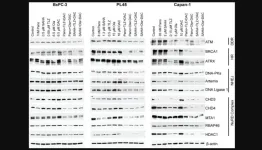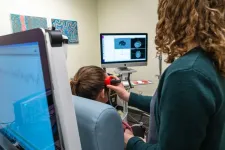(Press-News.org) A short course of immunotherapy was found to be highly effective in a subset of patients with colon cancer. The treatment, which consisted of two cycles of immunotherapy prior to surgery, was effective in almost all patients. In two third of patients, there were no longer any live tumor cells at the time of surgery. The patients’ immune system had cleaned up the cancer cells. These groundbreaking discoveries were made as part of the NICHE-2 trial at the Netherlands Cancer Institute and have been published in the New England Journal of Medicine.
Patients with colon cancer with a specific genetic makeup, known as mismatch-repair deficient (dMMR) or microsatellite instable (MSI) were treated with one cycle of ipilimumab and two cycles of nivolumab. In 95% of patients, the tumor was either complete or almost completely gone, which was measured as 10% or less cancer cells found at the time of surgery. In 68% of patients there were no live cancer cells.“This specific type of colorectal cancer contains a high number of DNA errors, which means that the tumor cells are more easily detected by the immune system. The immune system only requires a small incentive to successfully target the tumor cells,” Chalabi says to explain the success of the treatment. Equally important, none of the patients had developed metastases in the average of two years that they have been followed so far.
The first signs of success were observed quite early on after medical oncologist Myriam Chalabi initiated the NICHE trial. Chalabi: “We wanted to investigate what immunotherapy could do for people with non-metastatic colon cancer. We witnessed something that rarely ever happens: every single patient in the study responded well to the new treatment.” Four years ago, Chalabi and her colleagues published the results of the trial involving the initial 20 patients with this type of colorectal cancer. “Back then we had treated 20 patients with mismatch-repair deficient tumors, and all had benefited from the treatment. We had never seen anything like it and knew that if we could show this in a larger group of patients, this treatment could be a game-changer.” That led to the development of NICHE-2, the current study that was published.
Neoadjuvant immunotherapy
Immunotherapy given before surgery is known as neoadjuvant immunotherapy. It is intended to prevent cancer from spreading or returning, and in case of larger tumors, to make surgery easier. The main idea behind treating before surgery is that the immune system can interact with more tumor cells and more of the DNA errors that these tumors have, as well as more immune cells, which makes it more effective in attacking the cancer cells.
Unprecedented results
Chalabi: “Now, more than two years after treatment, none of the patients saw recurrence even though many had high-risk tumors. The results are unprecedented. The efficacy as well as the side-effects are much better compared to chemotherapy before surgery, a treatment that only works in 1 out of 20 patients.”
In the clinic
In the Netherlands, the studied treatment is not yet available for patients. “This trial is intended to make this treatment available to patients with this type of colorectal cancer. Towards the end of the year, we will have followed these patients for three years. If the majority of these patients is still cancer-free, we should work towards making this therapy a standard treatment option.”
“We have reached the point where we can forgo chemotherapy before surgery in this and comparable studies in patients with colorectal cancer who respond well to neoadjuvant immunotherapy. The next and crucial step is to make this treatment available as a standard treatment. That is what we are currently working towards. And eventually we hope to even provide the option of avoiding surgery in patients who respond well.”
Standing ovation
Two years ago, Chalabi presented the preliminary results at a large international congress. She was awarded with a standing ovation for her work, and the #Chalabiplot phenomenon on X (formerly known as Twitter). This refers to a graph she showed in her presentation, visualizing the impressive results of the trial. “Thinking back to that moment still gives me goosebumps. The positive emotions in the hall were palpable: these results could drastically improve the treatment outcomes of future patients.”
This graph shows the decrease in tumor as measured by the pathologist after surgery. Every bar depicts an individual patient, and when the bar reaches -100 it means that the tumor was completely gone. MPR stands for major pathologic response, which is the boundary of 10% or less live tumor cells.
END
Immunotherapy before surgery very successful in treating colorectal cancer
Nearly all cancer cells completely gone
2024-06-05
ELSE PRESS RELEASES FROM THIS DATE:
Encouraging Phase 1 data for glioblastoma treatment reported by UAB researchers at ASCO
2024-06-05
BIRMINGHAM, Ala. – Preliminary clinical data for glioblastoma multiforme patients enrolled in a Phase 1 clinical trial at the University of Alabama at Birmingham demonstrated that 92 percent of evaluable patients treated with INB-200 exceeded a median progression-free survival of seven months with concomitant temozolomide chemotherapy. The median follow-up was 11.7 months.
This survival data along with radiographic improvements are indicative of positive treatment effects, which highlights the potential of IN8bio’s genetically modified, chemotherapy-resistant gamma-delta T cells ...
YALE NEWS: Early life experiences linked to racial disparities in cognition
2024-06-05
New Haven, Conn. — Negative early life experiences, such as attending segregated schools, contribute significantly to cognitive decline and cognition disparities between older Black and white Americans, according to a new study led by researchers at the Yale School of Public Health.
The study, published in JAMA Internal Medicine, is the first to look at the impact of school segregation upon later life cognition using a large representative sample of the U.S. population, said lead author Xi Chen, associate professor of public ...
Nationally known pediatric infectious disease researcher named vice chancellor for research at the University of Tennessee Health Science Center
2024-06-05
After an extensive national search, Jessica Snowden, MD, MS, FAAP, MHPTT, a nationally recognized pediatric infectious disease specialist and researcher, has been named the new vice chancellor for Research at the University of Tennessee Health Science Center, effective September 1. She will also serve as a professor in the College of Medicine in the Department of Pediatrics.
Currently the vice dean for Research and chief of Pediatric Infectious Diseases at the University of Arkansas for Medical Sciences (UAMS), Dr. Snowden is known as a dedicated mentor and a leader in integrating clinical, research, and academic efforts to advance the understanding ...
Synergistic cytotoxicity of HDAC and PARP inhibitors and decitabine in pancreatic cancer cells: implications for novel therapy
2024-06-05
“The results provide novel preclinical data that demonstrate synergism between HDACi- and PARPi-mediated inhibition of DNA repair and decitabine in pancreatic cancer [...]”
BUFFALO, NY- June 5, 2024 – A new research paper was published in Oncotarget's Volume 15 on June 3, 2024, entitled, “Synergistic cytotoxicity of histone deacetylase and poly-ADP ribose polymerase inhibitors and decitabine in pancreatic cancer cells: Implications for novel therapy.”
Histone deacetylase inhibitors (HDACi) can modulate the acetylation status of proteins, influencing the genomic instability exhibited by cancer cells. Poly (ADP ribose) ...
UBC-developed oral insulin drops offer relief for diabetes patients
2024-06-05
Diabetes rates continue to rise, with 11.7 million Canadians living with diabetes or pre-diabetes. At UBC, scientists have created a pain-free drug delivery method to help people with diabetes manage the disease and maintain their health more easily.
Researchers at the Li Lab have developed oral insulin drops that when placed under the tongue are quickly and efficiently absorbed by the body, potentially replacing the need for insulin injections.
The drops contain a mixture of insulin and a unique cell-penetrating peptide (CPP) developed ...
Could taking certain drugs reduce risk of ruptured brain aneurysm?
2024-06-05
EMBARGOED FOR RELEASE UNTIL 4 P.M. ET, WEDNESDAY, JUNE 5, 2024
MINNEAPOLIS – A new study suggests that people who take a few common drugs may have a decreased risk of having a bleeding stroke due to a ruptured brain aneurysm. The study is published in the June 5, 2024, online issue of Neurology®, the medical journal of the American Academy of Neurology. The results do not prove that these drugs reduce the risk of this type of aneurysm; they only show an association.
“We urgently need new ways to prevent this type of stroke, which occurs at younger ages and with a higher death rate than other types of stroke,” said study author Jos Peter Kanning, ...
Fellowships will advance reporters’ coverage of aging in America
2024-06-05
The Gerontological Society of America (GSA) has received renewed grant support to welcome a 15th class of reporters for the Journalists in Aging Fellows Program. The 2024 funders to date include Silver Century Foundation, The John A. Hartford Foundation, and National Institute for Health Care Management Foundation (NIHCM).
Since its founding in 2010, this program has been responsible for more than 800 news stories produced by 231 alumni. It has two goals: to educate journalists about issues in aging, better allowing them to spread a new awareness to general-audience, ethnic, and other minority populations; and to disseminate information about new scientific findings, ...
Study shows AI-driven cyberattacks can inflict damage on GDP and supply chains for the world’s largest economies
2024-06-05
Cyberattacks driven by Artificial Intelligence (AI) pose unprecedented risks to global economies, supply chains, and trade. A forthcoming study from the journal Risk Analysis explores the cascading impacts of AI-driven cyberattacks.
Unlike traditional cyberattacks, which are typically manual or scripted, AI-driven cyberattacks utilize AI and machine learning algorithms to enhance their effectiveness, stealthiness and adaptability. AI-driven cyberattacks can autonomously learn and evolve their tactics, techniques and procedures based on real-time feedback and environmental changes.
Through simulation scenarios, the researchers discovered the potential ...
Allison Institute announces appointment of two immunobiology experts as associate members
2024-06-05
HOUSTON ― The James P. Allison Institute at The University of Texas MD Anderson Cancer Center today announced the appointment of its newest members, Susan Bullman, Ph.D., and Xi Chen, Ph.D., to further the institute’s ongoing work of impactful immunobiology research. These accomplished researchers, joining as associate members, bring valuable expertise in studying how the intratumoral microbiome and the immune microenvironment influence patient responses to immunotherapy.
As Allison Institute members, Bullman and Chen will lead impactful research programs aligned with the institute’s ...
Focused Ultrasound Foundation designates Virginia Tech as a Center of Excellence
2024-06-05
The Focused Ultrasound Foundation has designated Virginia Tech as a Focused Ultrasound (FUS) Center of Excellence, making it the sixth such center in the United States and one of only 12 in the world.
“Virginia Tech possesses significant strengths in the FUS field, and it is an honor to recognize them as a Center of Excellence,” said Neal F. Kassell, founder and chairman of the Focused Ultrasound Foundation. “With distinguished experts across the colleges of engineering, science, veterinary medicine, and medicine, ...
LAST 30 PRESS RELEASES:
Machine learning tool can predict serious transplant complications months earlier
Prevalence of over-the-counter and prescription medication use in the US
US child mental health care need, unmet needs, and difficulty accessing services
Incidental rotator cuff abnormalities on magnetic resonance imaging
Sensing local fibers in pancreatic tumors, cancer cells ‘choose’ to either grow or tolerate treatment
Barriers to mental health care leave many children behind, new data cautions
Cancer and inflammation: immunologic interplay, translational advances, and clinical strategies
Bioactive polyphenolic compounds and in vitro anti-degenerative property-based pharmacological propensities of some promising germplasms of Amaranthus hypochondriacus L.
AI-powered companionship: PolyU interfaculty scholar harnesses music and empathetic speech in robots to combat loneliness
Antarctica sits above Earth’s strongest “gravity hole.” Now we know how it got that way
Haircare products made with botanicals protects strands, adds shine
Enhanced pulmonary nodule detection and classification using artificial intelligence on LIDC-IDRI data
Using NBA, study finds that pay differences among top performers can erode cooperation
Korea University, Stanford University, and IESGA launch Water Sustainability Index to combat ESG greenwashing
Molecular glue discovery: large scale instead of lucky strike
Insulin resistance predictor highlights cancer connection
Explaining next-generation solar cells
Slippery ions create a smoother path to blue energy
Magnetic resonance imaging opens the door to better treatments for underdiagnosed atypical Parkinsonisms
National poll finds gaps in community preparedness for teen cardiac emergencies
One strategy to block both drug-resistant bacteria and influenza: new broad-spectrum infection prevention approach validated
Survey: 3 in 4 skip physical therapy homework, stunting progress
College students who spend hours on social media are more likely to be lonely – national US study
Evidence behind intermittent fasting for weight loss fails to match hype
How AI tools like DeepSeek are transforming emotional and mental health care of Chinese youth
Study finds link between sugary drinks and anxiety in young people
Scientists show how to predict world’s deadly scorpion hotspots
ASU researchers to lead AAAS panel on water insecurity in the United States
ASU professor Anne Stone to present at AAAS Conference in Phoenix on ancient origins of modern disease
Proposals for exploring viruses and skin as the next experimental quantum frontiers share US$30,000 science award
[Press-News.org] Immunotherapy before surgery very successful in treating colorectal cancerNearly all cancer cells completely gone






